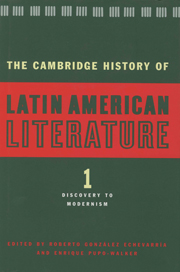Book contents
- Frontmatter
- Introduction to Volume 1
- 1 A brief history of the history of Spanish American Literature
- 2 Cultures in contact: Mesoamerica, the Andes, and the European written tradition
- 3 The first fifty years of Hispanic New World historiography: the Caribbean, Mexico, and Central America
- 4 Historians of the conquest and colonization of the New World: 1550–1620
- 5 Historians of the colonial period: 1620–1700
- 6 Colonial lyric
- 7 Epic poetry
- 8 Spanish American theatre of the colonial period
- 9 Viceregal culture
- 10 The eighteenth century: narrative forms, scholarship, and learning
- 11 Lyric poetry of the eighteenth and nineteenth centuries
- 12 Spanish American theatre of the eighteenth century
- 13 The nineteenth-century Spanish American novel
- 14 The brief narrative in Spanish America: 1835–1915
- 15 The Spanish American theatre of the nineteenth century
- 16 The essay in Spanish South America: 1800 to Modernismo
- 17 The essay of nineteenth-century Mexico, Central America, and the Caribbean
- 18 The gaucho genre
- Index
- Bibliographies
- References
16 - The essay in Spanish South America: 1800 to Modernismo
Published online by Cambridge University Press: 28 March 2008
- Frontmatter
- Introduction to Volume 1
- 1 A brief history of the history of Spanish American Literature
- 2 Cultures in contact: Mesoamerica, the Andes, and the European written tradition
- 3 The first fifty years of Hispanic New World historiography: the Caribbean, Mexico, and Central America
- 4 Historians of the conquest and colonization of the New World: 1550–1620
- 5 Historians of the colonial period: 1620–1700
- 6 Colonial lyric
- 7 Epic poetry
- 8 Spanish American theatre of the colonial period
- 9 Viceregal culture
- 10 The eighteenth century: narrative forms, scholarship, and learning
- 11 Lyric poetry of the eighteenth and nineteenth centuries
- 12 Spanish American theatre of the eighteenth century
- 13 The nineteenth-century Spanish American novel
- 14 The brief narrative in Spanish America: 1835–1915
- 15 The Spanish American theatre of the nineteenth century
- 16 The essay in Spanish South America: 1800 to Modernismo
- 17 The essay of nineteenth-century Mexico, Central America, and the Caribbean
- 18 The gaucho genre
- Index
- Bibliographies
- References
Summary
Of all the literary forms, the essay is the least defined and can include texts as diverse as letters, biographies, speeches, newspaper articles, political decrees, and philosophical treatises. While this chapter does not pretend to define the essay as a literary form, the texts discussed do reflect the many forms essays assume. More vexing than the question of genre is the question of organization. As the principal medium of published thought, the essay is intimately linked to developments in intellectual history generally. Consequently, it is very tempting to categorize Latin American thinkers using terms like Liberalism, Utilitarianism, and Positivism that have emerged in European thought. Applying European labels to Spanish American thought, however, assumes a near-perfect transmission of ideas from Europe to Spanish America since, without such transmission, European categories merely substitute preexisting concepts for real understanding. As it turns out, tracing the penetration of European thought into Spanish America is a complex and largely unresolvable problem. We have only sketchy ideas of what texts nineteenth-century South American essayists read, and we know even less about how well or completely they read. Moreover, even when influence seems undeniable, it is seldom definitive. Indeed, what distinguished Spanish America’s most creative nineteenth-century thinkers, Sarmiento for example, is their ability to modify and even deform European thought as they mix it with insights applicable to their special circumstances. In view of the above, I have organized this article around old-fashioned notions of time, place, and generation.
- Type
- Chapter
- Information
- The Cambridge History of Latin American Literature , pp. 556 - 589Publisher: Cambridge University PressPrint publication year: 1996



